Breaking their silence: The choirs making a comeback from lockdown
More than 2 million people are members of amateur choirs and for many of them their first post-lockdown concerts are just about to begin. Christine Manby writes

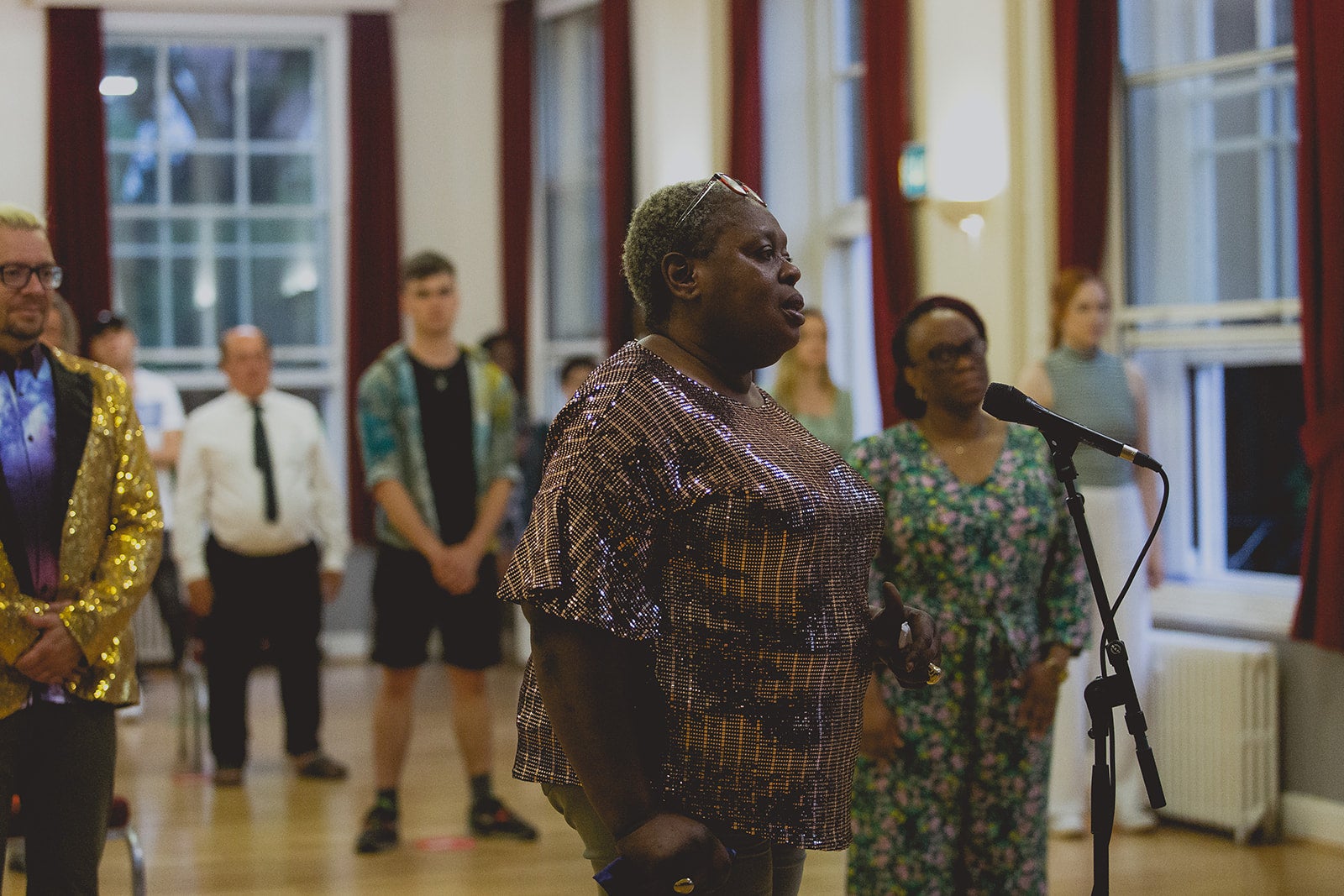
When Boris Johnson announced the first national lockdown in March 2020, it felt as though the whole world had suddenly fallen silent. For one group in particular, the silence lasted longer than for the rest of us. More than 2 million people in the United Kingdom are members of amateur choirs and it wasn’t until July of this year that they were finally allowed to meet and sing indoors again in groups of more than six.
Among those choirs planning a big comeback with their first post-lockdown concert is the Dulwich Chamber Choir. On 9 October, they’re going to be breaking their silence with a performance of Bach’s Mass in B Minor at St James’s Church in Piccadilly. The performance will also celebrate the choir’s 10th anniversary.
Richard Mayo, director of music at Dulwich College, leads the choir, which comprises around 30 singers ranging in age from 21 to 70. He describes why the Mass is so special.
“The B Minor Mass was not performed in its entirety in Bach’s lifetime, but it represents an entire lifetime’s work. It spans the whole of Bach’s compositional career and contains lots of material which was adapted from other works. Almost no compositional stone is left unturned. It is one of the greatest pieces of music in western civilisation.”
It is also widely considered to be one of the most difficult and demanding pieces in the choral repertoire and preparing a choir for its performance is no small feat. The Dulwich Chamber Choir did not attempt to continue to practise remotely during the lockdowns. “Musically, Zoom has its limitations,” explains Mayo. “You can’t substitute the live matter of making music. A Zoom rehearsal is an almost totally wooden experience. Though I do understand that Zoom practices did give some people some sense of community.
“Singing is a physical thing to do, using full lung capacity and projecting the sound. Practising in a sitting room simply isn’t the same. Thus, when the choir returned, inevitably they were some distance from being ‘match fit’. The B Minor Mass demands strong technique and stamina because it is a work of such enormous scale.”
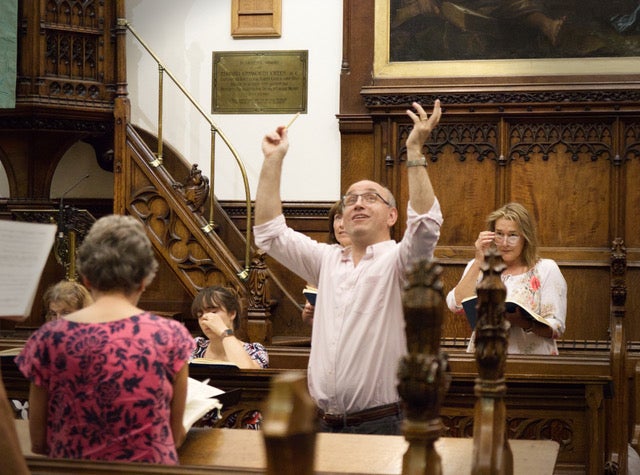
There was also the matter of reconnecting with the art of singing together in the first place. “With ensemble singing, you need to be aware of the singers around you and have an ear for what the other parts are doing. Those skills can only be kept alive by live rehearsal.”
Fortunately, the chamber choir has found a perfect Covid-safe practice space in Christ’s Chapel in Dulwich Village. The chapel naturally lends itself to social distancing. The sopranos and altos sing from the pews, the basses from the gallery and the tenors from the organ loft. Mayo hopes that the choir’s audience will be reassured that their performance venue, St James’s Church, is equally sizeable and well-ventilated (JS Bach's Mass in B Minor, 7.30pm on Saturday 9 October, at St James' Piccadilly, W1J 9LL, tickets £15: https://www.eventbrite.co.uk/e/js-bach-mass-in-b-minor-tickets-165899286231).
Asked if he felt any frustration that singing was one of the last activities to come back, Mayo was sanguine. “I understood the desperation and disappointment but the responsibilities are enormous. In Covid terms, singing has carried quite a lot of risk. We did the right thing. I’m relieved we are emerging.”
You might feel that you haven’t got time to practise but when you do, it makes you feel so much better
For many of the Dulwich Chamber Choir’s singers, music is a family affair. Richard Mayo’s daughter will be taking part in the 9 October performance. Choir member Gill Bennett OBE will be singing alongside her son Henry Chin. Gill is a historian, specialising in secret intelligence. She most recently published The Zinoviev Letter (OUP), about the fake document, purported to be a directive from Grigory Zinoviev, head of Communist International to the Communist Party of Great Britain, that might have cost the Labour Party the 1924 general election.
Gill has had a challenging pandemic. She caught Covid right at the beginning and while she seemed to recover relatively quickly, over the next few months she suffered frequent relapses. “It was absolutely dreadful. I had a lot less stamina.” Then, in the summer of 2020, she fell and broke her wrist. Fortunately, the operation to fix it fell in the brief period between the lifting of restrictions and Lockdown Two.
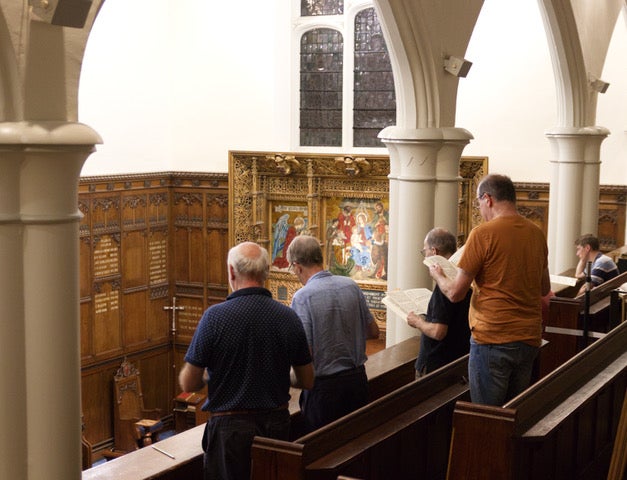
Gill and Henry spent the first lockdown together, Henry having recently retired from his career as a submariner. For several months, they were unable to see Gill’s younger son, Henry’s brother Dominic, who lives in residential care. Making music played a big part in helping them to get through the long, boring weeks of social isolation. Henry plays piano, cello and ukulele. Gill is a talented percussionist, playing the marimba and the steel drums, to which she was introduced by her late partner who was from the West Indies. Gill and Henry recorded their home jam sessions, which included covers of songs old and new alongside original compositions, and uploaded them to a YouTube channel called Gill’s New Groove. Sharing the links was a way to keep in contact with choir members and other friends.
Bach’s Mass in B Minor holds a special place in Gill’s heart. “I first sang the B Minor Mass in 1974. I find it reaches the parts that other things can’t reach.” She has sung the piece several times since, with various different choirs.
She is looking forward to singing in public again and is enjoying the rehearsals. “You might feel that you haven’t got time to practise but when you do, it makes you feel so much better. At the first rehearsal, we all arrived wearing masks and Richard disposed us around the chapel, with big distances between us. Social distancing was actually a very good discipline as you can’t rely on the person next to you to make up for how you’re singing. I was rusty and felt completely exhausted but everybody was emotional and uplifted. I’m looking forward to singing the Mass with a small choir. It feels like it represents the pinnacle of my singing career. I’m 70 and don’t know for how many more years I’ll be able to sing with this choir.”
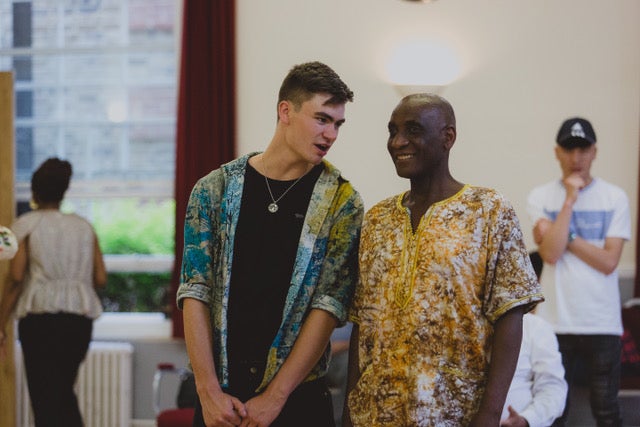
Age should be no barrier to Gill’s next project, which is to record some Blondie covers. Debbie Harry has six years on her.
The importance of music to Gill’s family life and sense of wellbeing is clear. Richard Mayo agrees that practising to sing the Mass “has given people a great sense of hope; an overwhelming sense of joy to be singing again and to be singing this piece of music in particular”.
Amanda Brookfield, fellow singer and co-founder of the choir as well as a novelist, adds: “It would be hard to describe the elation of being able to gather again to sing. Choral singing is about so much more than each person spouting a tune that blends nicely with other tunes. It is more like a team sport, a massive, joint effort to produce something spine-tinglingly beautiful, doing as much justice as one can to the genius who composed the piece. Physically, too, when you sing, drawing in and expelling all that oxygen (from deep in your diaphragm if your technique is right!) there is an exhilaration, a total high, which stays with you afterwards, leaving you heady and happy. Emotional wellbeing, in other words, and one of the reasons we wanted to get the chamber choir singing again as soon as possible. Choir members have not avoided personal losses and difficulties over the last 18 months. All of us have thrown ourselves into the Bach with a heightened sense of need, good fortune and utter joy.”
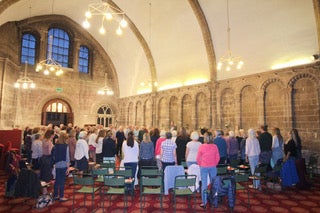
On the other side of the country, the Gloucester Choral Society is also planning to resume live performances this autumn, singing “The Creation” by Haydn at Gloucester Cathedral on 16 October. The Choral Society is a well-established choir. Founded in 1845, it would have celebrated its 175th anniversary last year were it not for the pandemic.
The society has between 125 and 140 members at any one time, all auditioned by musical director and conductor Adrian Partington. The lockdown came as a particular shock for Partington, who also directs Gloucester Cathedral’s professional choristers. “I saw my life disappearing in a puff of smoke. I was stunned.” Once he had accepted the reality of lockdown, however, Partington did his best to make the most of the enforced “practice retirement”, concentrating on his personal musical enthusiasms, including, he says, “lots of piano practice. After six months, however, I felt the acute withdrawal symptoms from the act of sharing music-making.”
The Gloucester Choral Society was able to get together briefly in September 2020, when a slight easing of restrictions allowed for rehearsals in the cathedral. Fifty singers were easily socially distanced in the vast nave, beneath the 70ft-high vault. But then strict lockdown returned. Post-Christmas, the Choral Society did move to Zoom, but Partington shares Mayo’s frustration with digital rehearsals. “I can’t hear what people are doing. Variable broadband speeds mean that everyone is out of sync. It was more a matter of keeping people engaged.”
Partington was relieved when rehearsals were at least able to resume outdoors. “We gathered on the lawn in the Bishop’s Garden, one of the private gardens at the cathedral, and sang to the accompaniment of bird song.”
The musical world is shrinking. There is less interest in ‘serious music’ than ever. There are too many distractions and successive governments have not rated music as a serious subject
As rehearsals were allowed to move indoors, the Choral Society used the Chapter House, the cathedral’s monastic meeting room, where they could be well-spaced out beneath a ceiling 30 feet high. Choir members who were less confident about being in that room were able to spill out into the cathedral’s medieval cloisters – made famous by the Harry Potter films – which are open to the elements along one side.
Gloucester Choral Society member, writer Jane Ayres, did her best to keep singing throughout lockdown, joining online rehearsals with David Hill’s London Bach Choir. She describes how, when the choral society was able to come together in the Bishop’s Palace Garden at Gloucester Cathedral, it “gave everyone a lift to be singing. Life was good again.”
Partington has chosen “The Creation” as the choir’s break-out piece for a variety of reasons. Firstly, because it is relatively easy to sing. He describes the melodies as “user friendly and tuneful, harmonically quite straightforward. They’re medicine for the voice. Haydn really understood singers.” There is also the symbolism of the music’s theme. “It’s fresh, positive and happy. I saw a link between the creation of life, and the renewal of our lives after the Covid crisis.”
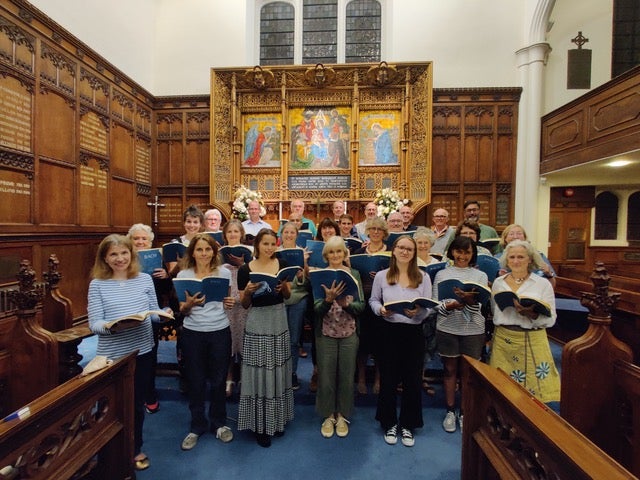
Like Mayo, Partington understands why choral singing had to cease for so long but he is frustrated at the government’s lack of support for the music industry in general throughout the pandemic. In particular, he laments the fate of 2020’s music students, who graduated into a world where making a living from live music was impossible. “Many were forced to give up on their musical dreams, for which they had worked long and hard.” Partington doesn’t believe some of them will ever be able to make up for the lost time. “Young musicians bore the brunt. It’s the unspoken tragedy of the pandemic.”
While Partington says that his local MP has been “very helpful”, he says that choral singing hasn’t had a champion in the Houses of Parliament since Ed Balls, then secretary of state for children, schools and families (and himself once a chorister), got behind the Sing Up campaign, which pledged £40m to support singing in primary schools in 2007.
Now, says Partington, “the musical world is shrinking. There is less interest in ‘serious music’ than ever. There are too many distractions and successive governments have not rated music as a serious subject in schools. It is pig-headed of politicians to ignore the complete benefits – psychological and physical - that music can bring. For many older people, weekly rehearsal is the high-point of their lives.”
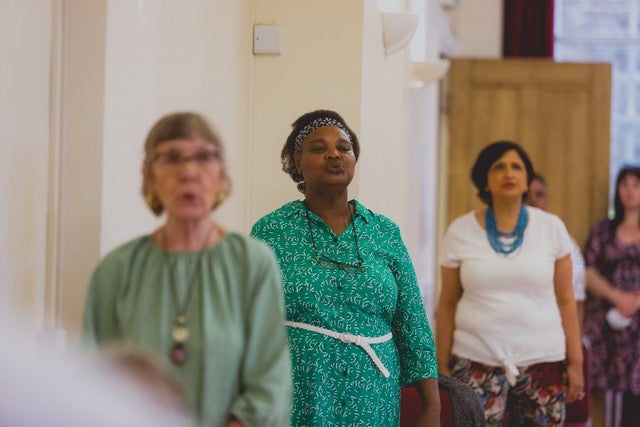
It's not just older people who reap huge benefits from the social engagement being part of a choir entails. Citizens of the World Choir (COTW) draws its membership from London’s refugees and asylum seekers and their friends in the city’s wider community. The choir’s members hail from more than 30 different nations, with diverse singing styles and musical traditions. While the choir does not audition members, some are renowned musicians in the countries they have had to flee.
The choir was the brainchild of Liberal peer Lord Roger Roberts of Llandudno, who dreamt of a project that would open its arms to the refugee community in the UK in the aftermath of the closure of the Calais Jungle. He enlisted the help of musicians Becky Dell and Tom Donald and during Easter 2017, Citizens of the World Choir was born. With support from a number of London councils, the choir made its first public appearance at the Houses of Parliament, where it performed a mash-up of Scarborough Fair and Arabic rap.
Pre-pandemic, the choir met at Mycenae House in Greenwich. When Covid struck, the COTW team soon realised that the challenges facing the choir’s members would be greater than simply missing out on live choir practice. Lockdown meant that all sorts of things ground to a halt, including the processing of asylum applications. Tom Donald explains: “Many choir members felt very isolated. The world shut down and a lot of other issues were not being addressed.”
The choir used grants to buy smart phones for those members who didn’t have access to technology. This alleviated the practical problem of accessing basic services that so many of us take for granted. It also meant that COTW could rehearse remotely, an opportunity which Donald – who had already taken his London Contemporary School of Piano online – was especially pleased to embrace.
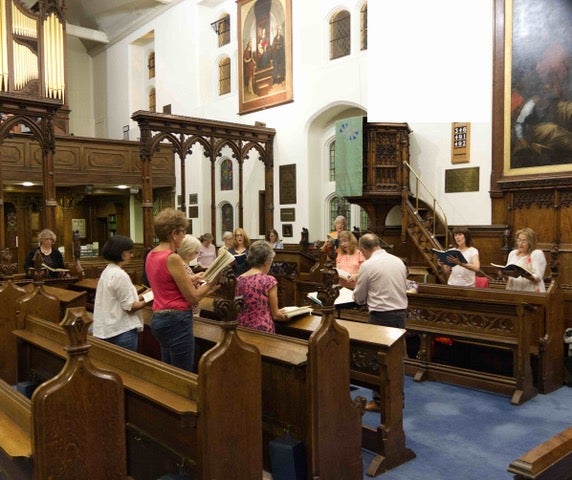
Zoom rehearsals were about more than singing for COTW. The online sessions also became a platform for sharing stories. Outside the practices, the choir formed a WhatsApp group, where members could upload snatches of music from their home countries, voice recordings, even recipes. “There was a lightness to it,” Donald says.
Prior to the pandemic, Donald had been commissioned by the Arts Council to compose a piece of music with the choir. While it was impossible to get together and work together in real life, the WhatsApp group provided a unique means of collaboration. Donald took the content of the WhatsApp chats, the different languages and voices, and used them as inspiration for his composition. “Circumstances made me write a certain way. I had to say goodbye to the usual conventions.”
Over time, a symphony with five movements began to emerge and as the last lockdown started to ease, the choir was able to get together with social distancing to record one track. It wasn’t easy. “A choir needs to be close”, Donald explains – but clever microphone techniques helped to overcome some of the acoustic challenges.
Without friends or family in the city, when the first lockdown came, like Mehmet and Kadir, Kazim found himself utterly alone
The WhatsApp symphony, called A Symphony of Voices, was released in June for Refugee Week. Listening to it in its entirety for the first time, several choir members commented that it was “cut from a moment in time”. The symphony begins in a minor key which rises throughout. The last song, sung by London-based Scottish-Nigerian jazz-folk singer and composer Bumi Thomas, is about spring. Having been threatened with deportation, Thomas was granted indefinite leave to remain in 2020, after a campaign that attracted more than 25,000 supporters.
Among the choir members who took part in the recording of the symphony were Mehmet and Kadir, two professional musicians from Turkey. Mehmet is a singer, trained at a Turkish conservatory. Kadir plays the saz, a type of long-necked lute.
With his friend Ahmet interpreting, Mehmet tells me that when the third lockdown was announced, he was living alone in a hotel. Isolated and depressed, he turned to a mental health support programme run by the Red Cross. It was a volunteer at that Red Cross programme who connected him with COTW.
“Straightaway, joining the choir affected me positively. I used to sing traditional Turkish songs but soon came to know songs in English and from other cultures as well.”
For the Symphony of Voices, Mehmet sang Turkish words to Tom Donald’s music. “The words reflected what I was feeling.” Mehmet was particularly pleased to discover that COTW takes music so seriously. Finally being able to meet other choir members in person post lockdown, Mehmet says, “I have gone back to the years when I was in the conservatory. It is like the old days. I look forward to rehearsals on Wednesdays in the same way as I used to look forward to rehearsals back in Turkey. I may not be able to speak English but the language of music is the same for us all.”
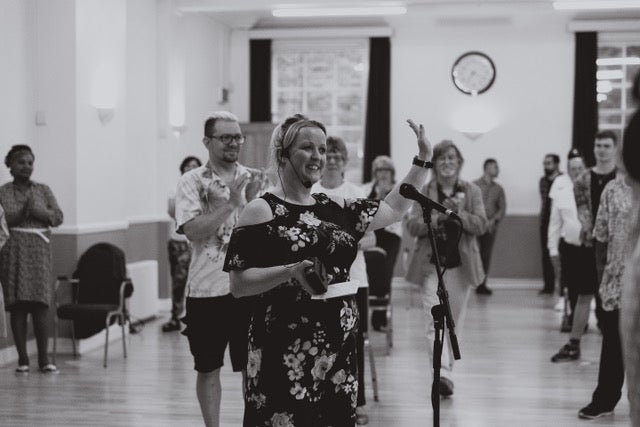
Kadir, who was introduced to the choir by Mehmet, is similarly happy that the rehearsals have helped him to make connections in London and adapt to his new life. “We have a lot to learn from each other,” he says, regarding the myriad musical traditions that are brought together in the COTW rehearsal room.
Citizens of the World hope to be singing for the public again soon, with exciting projects in the pipeline for later this year. One singer in particular is looking forward to performing live again, having made his debut with the choir on the BBC earlier this year. Kazim, 18, was born in Afghanistan, later moving to Iran with his family. He has been in London since last year. Without friends or family in the city, when the first lockdown came, like Mehmet and Kadir, Kazim found himself utterly alone.
Citizens of the World provided a lifeline. “It was very helpful to come to choir. Very good for me.” He credits the choir with providing him with friendship and helping to improve his understanding of English, though Kazim’s favourite piece is “Siyahamba”, a Zulu song.
As Kazim waits for a decision to be made on his future in the United Kingdom, he is unable to make the sort of plans the average British teenager can. “Maybe I will have to leave tomorrow,” he shrugs. In a week full of worry, choir practice is a beacon of hope and happiness. “For one hour,” Kazim says. “My mind is changed. The choir is like my family.”
Togetherness is a common theme for Britain’s newly reunited choral singers. Tom Donald says: “In this country we can bring people together through music. We can’t do it through politics, but when we get people together to sing, we see that no differences are too great. We’re converted to the idea that diversity is a real strength.”
The Gloucester Choral Society’s Adrian Partington agrees. “Music is not a thing to be done on your own. It’s about connecting through something bigger than yourself. Lockdown made me think very carefully about the interaction and enjoyment of other people’s gifts that music brings. The sharing.”
Gloucester Chorister Jane Ayres sums it up: “People who don’t sing might find it difficult to understand the absolute joy of being back together. It’s almost impossible to sing choral music without being totally in the moment and the thrill of a large number of people all concentrating on making the most beautiful sound possible is truly visceral … it’s food for the body and the soul.”
The Dulwich Chamber Choir is performing at 7.30pm on Saturday 9 October at St James’s Church, Picadilly. For more information, click here. The Gloucester Choral Society is performing on 16 October 2021. For tickets, click here.
Join our commenting forum
Join thought-provoking conversations, follow other Independent readers and see their replies
Comments



Bookmark popover
Removed from bookmarks